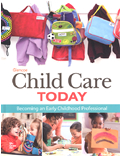
Child Care Today ©2012Chapter 3: Professional SkillsChapter SummaryChild care professionals have many responsibilities for their employees and the families they serve. Early childhood professionals must communicate well with others. Open door policies allow parents or approved family members to visit at any time. Bilingual families should receive communication in their primary language. There are many ways to communicate a program’s goals through public relations. Communications with families can be both written and spoken. Staff members who communicate have a better working environment. All information in an early childhood program should be documented and recorded. The standards of right and wrong that apply to professional behavior are called professional ethics. Early childhood professionals have ethical duties to their employers, to children and families, and to the community and society at large. Advocacy is the process of pleading a cause to influence change for the best interests of others. Early childhood professionals have many opportunities to become advocates for child care and families. Advocacy efforts can be short- or long-term, depending on how much time and determination you have. |  |















